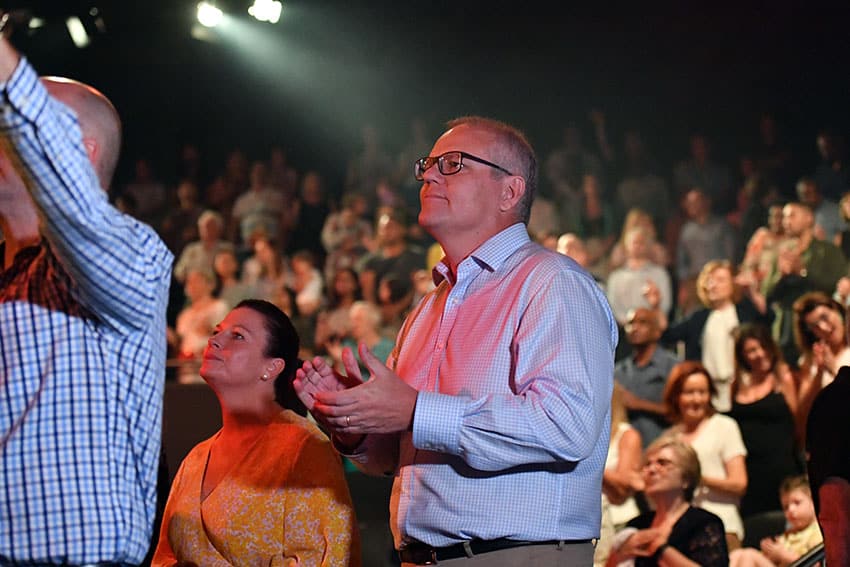
Feel free to defend the right of Christians to offer their points of view, even to hold public office
Section 116 of the Australian Constitution reads as follows: “The Commonwealth shall not make any law for establishing any religion, or for imposing any religious observance, or for prohibiting the free exercise of any religion, and no religious test shall be required as a qualification for any office or public trust under the Commonwealth.”
When discussing religious freedom, it is usually the first part of this section that draws our attention, that is, the prohibition on laws that would establish a religion, impose religious observance or prohibit its free exercise.
But while paying attention to the media and the Twittersphere this past week, my attention has shifted to the last part of this constitutional provision. That no religious test shall be required for any office under the Commonwealth seems pretty clear from the words of section 116, but there have been a number of commentators who seem to suggest that this shouldn’t apply to the Prime Minister, or at least not to a Prime Minister with a firm Pentecostal faith.
This is about…whether anyone in or aspiring to political leadership should be forced to renounce or at least hide their Christian faith in order to serve in high public office.
A couple of weeks ago, Prime Minister Scott Morrison spoke at a conference of the Australian Christian Churches in Queensland. It wasn’t a political speech, well at least, not primarily, but a speech about his own faith and the contribution of Christianity to this country.
After reading the transcript, it seemed to me that what the Prime Minister was saying was that governments cannot do everything when it comes to looking after the community.
“You can’t replace community with governments, with the market,” the Prime Minister said. “You can’t replace the family. You can’t replace marriage. You can’t replace the things that are so personal and ingrained, and come out of us as individuals, with systems of power or systems of capital. These are important things. But they can’t replace community.”
He told the crowd gathered that you can’t pass a law or erect a building that will turn a person’s attention from themselves to the person beside them: those intangibles can only be provided by a community that realises they are responsible for one another. He urged the churches to continue to go out and build community, because it’s something that governments can’t do.

He also said that it is the job of people of faith to “reach out and let each and every Australian know that they are important,” created in the image of God and loved and valued as an individual, rather than part of a group. He said that one of the most corrosive aspects of identity politics is that it results in a “tendency for people not to see themselves and value themselves, in their own right, as individuals,” but rather to “see themselves only defined by some group”.
He said that identity politics not only affected how we view ourselves, but also how we view others. If we see others as part of a group, he said, it is easier to be disrespectful towards them, particularly with the relative anonymity of social media. Again, he said, it was the role of the Christian community to respond to that; to see and treat each person as a unique and valuable individual.
All in all, I thought the speech was pretty good. I wouldn’t describe my spirituality as charismatic by any stretch and so I did find it a little overly-evangelical in parts, but I thought the underlying message was good: governments cannot – and indeed, should not – intrude in every area of individual and community need, because there are some aspects of this need that are better addressed by faith communities.
[Scott Morrison’s] speech has been deliberately mischaracterised by his political enemies and labelled as dangerous
Naturally, his speech has been deliberately mischaracterised by his political enemies and labelled as dangerous by those who reject the claim that there are any social needs that governments are not best placed to meet, because they want to see faith relegated solely to the private sphere. The idea that faith communities and particularly, the Christian churches, address broader social need would put this at risk, so the suggestion is anathema.
I know I used this column just two weeks ago to provide a defence of Jenny Morrison, and now I’m doing the same for the PM. This might have some of you thinking that I am an apologist for the Morrison family or, at the very least, some Liberal Party hack. Actually, I’m neither.
This isn’t about the Morrisons or about the Liberal Party or any other party. It is about the place of Christianity in this country, and in particular, whether anyone in or aspiring to political leadership should be forced to renounce or at least hide their Christian faith in order to serve in high public office.
The Morrisons are the current target but we would be stupid to think that tthe next person of faith who sticks his or her head above the parapet won’t be targeted – particularly in politics. If we don’t speak up in their defence, then we will share at least some of the blame when no person of serious faith is willing to put their name on the ballot.
Related:
